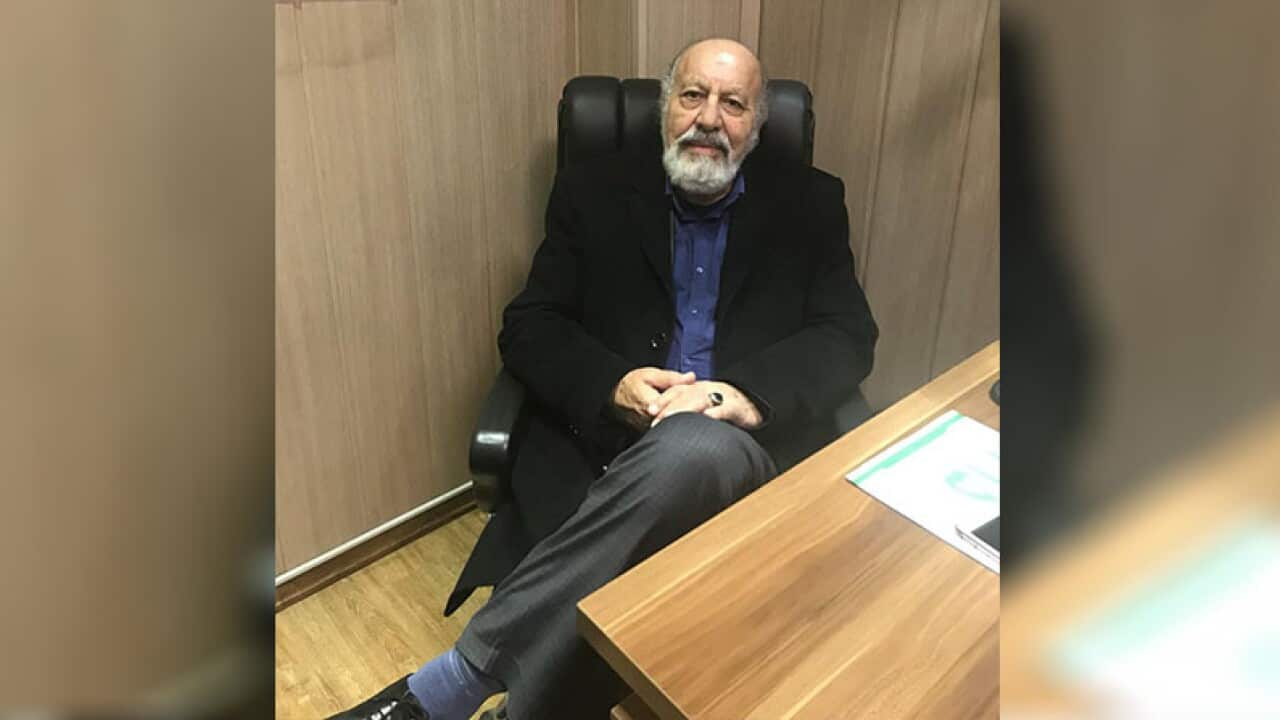The family of 82-year-old Australian-Iranian grandfather Shokrollah Jebeli says they hold strong concerns about his physical and mental health, after a 17-month detention in a notorious Iranian prison.
Evin prison, near Tehran, has been used to detain political prisoners, academics and foreigners - including Australian academic Kylie Moore-Gilbert.
Mr Jebeli's family in Australia said his recovery from a stroke while in prison was hampered by the jail's poor conditions.
"He does not have access to appropriate facilities in Evin prison for older or disabled prisoners that are needed to sustain his life and his dignity as a human being," a family spokesperson said.
"He has fallen several times in the shower and cannot go to the prison’s medical clinic by himself, further impeding his access to health care."
The family said Mr Jebeli has also developed paralysis in both of his legs during his 17 months in prison, making it difficult for him to eat and sleep on the floor.
"His bed is made up of a thin mattress and blankets layered on top," the family said. "Eating and sleeping on the floor is inadequate for a man in Mr Jebeli’s condition and age group."
His mental health has also sharply deteriorated during his detention.
"He is no longer able to walk in the prison yard where he used to find relief from his ordeal by watching stray cats play," the family said.
"His mental health has deteriorated because of his continued imprisonment, conditions of detention and the denial of adequate specialised medical care. Consequently, he is suffering from severe mood swings and depression."
Amnesty International Australia has sent a letter to Foreign Affairs Minister Marise Payne, plus a separate letter to the United Nations Special Rapporteur on Iran, urging the immediate release of Mr Jebeli. Amnesty campaigner Nikita White said the health risk during the pandemic is heightened for Mr Jebeli due to his age and multiple medical conditions. The group also holds concerns around access to legal representation, she said.
Amnesty campaigner Nikita White said the health risk during the pandemic is heightened for Mr Jebeli due to his age and multiple medical conditions. The group also holds concerns around access to legal representation, she said.

The family of Shokrollah Jebeli say his mental and physical has deteriorated sharply during his 17 months in Evin prison. Source: Supplied
"He has had a number of hearings," Ms White told SBS News.
"He denies the allegations against him, and as the allegations were made by someone who is in (Iran's) Ministry of Intelligence. That raises concerns about the fairness of the allegations, and particularly the fairness of the trial he will face.
"We know of examples where people face unfair trials and are sent to prison with little or any evidence to support those charges."
Mr Jebeli faces criminal charges after being involved in a financial dispute two years ago, involving an amount between $5,000 and $20,000. The family says the other party in the dispute revealed to Mr Jebeli he was an intelligence officer for Iran.
The family said accusations against Mr Jebeli have not been substantiated with evidence and the nature of charges have not been made clear.
The Department of Foreign Affairs and Trade is helping to facilitate consular visits after initially refusing to intervene, citing the Iranian government's position that it does not recognise dual citizens.
In a statement, the department said it continues to advocate for the welfare of Mr Jebeli and is working to provide consular access for the family, but further comment was limited due to privacy obligations.
Ms White said there are concerns over the pattern of Iran detaining foreigners, such as Dr Moore-Gilbert, who was released in November 2020, and dual nationals such as British-Iranian charity worker Nazanin Zaghari-Ratcliffe.
"There is a really concerning pattern of dual nationals being detained with very little evidence to support their detention," she said.
"During the COVID-19 pandemic, the Iranian authorities released prisoners because COVID-19 did spread throughout the prison system - many of them were prisoners of conscience or political prisoners. So the authorities can and should release Mr Jebeli because of his vulnerability to the pandemic and also because of the other health conditions he suffers from."
Mr Jebeli travelled to Iran in 2007 to live there, after he migrated to Australia in 1976 on a business visa.
His family said he settled in Sydney, helping to build stronger bilateral economic ties through deals in the wheat and meat industries during the 1980s.
The family said he would seek to return to Australia if released.



